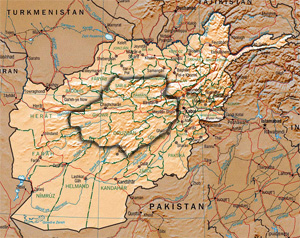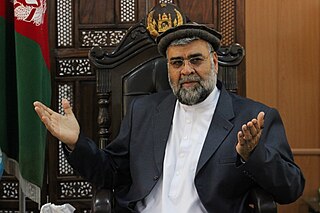Related Research Articles

The ancient history of Afghanistan, also referred to as the pre-Islamic period of Afghanistan, dates back to the Helmand Civilization around 3300–2350 BCE and the Oxus Civilization around 2400–1950 BCE. Archaeological exploration began in Afghanistan in earnest after World War II and proceeded until the late 1970s during the Soviet–Afghan War. Archaeologists and historians suggest that humans were living in Afghanistan at least 50,000 years ago, and that farming communities of the region were among the earliest in the world. Urbanized culture has existed in the land from between 3000 and 2000 BC. Artifacts typical of the Paleolithic, Mesolithic, Neolithic, Bronze, and Iron ages have been found inside Afghanistan.

Mazar-i-Sharīf, also known as Mazar-e Sharīf or simply Mazar, is the fourth-largest city in Afghanistan by population, with an estimated 500,207 residents in 2021. It is the capital of Balkh province and is linked by highways with Kunduz in the east, Kabul in the southeast, Herat in the southwest and Termez, Uzbekistan in the north. It is about 55 km (34 mi) from the Uzbek border. The city is also a tourist attraction because of its famous shrines as well as the Islamic and Hellenistic archeological sites. The ancient city of Balkh is also nearby.

The Soviet–Afghan War was a protracted armed conflict fought in the Soviet-controlled Democratic Republic of Afghanistan (DRA) from 1979 to 1989. The war was a major conflict of the Cold War as it saw extensive fighting between the DRA, the Soviet Union and allied paramilitary groups against the Afghan mujahideen and their allied foreign fighters. While the mujahideen were backed by various countries and organizations, the majority of their support came from Pakistan, the United States, the United Kingdom, China, Iran, and the Arab states of the Persian Gulf. The involvement of the foreign powers made the war a proxy war between the United States and the Soviet Union. Combat took place throughout the 1980s, mostly in the Afghan countryside. The war resulted in the deaths of approximately 3,000,000 Afghans, while millions more fled from the country as refugees; most externally displaced Afghans sought refuge in Pakistan and in Iran. Approximately 6.5% to 11.5% of Afghanistan's erstwhile population of 13.5 million people is estimated to have been killed over the course of the conflict. The Soviet–Afghan War caused grave destruction throughout Afghanistan and has also been cited by scholars as a significant factor that contributed to the dissolution of the Soviet Union, formally ending the Cold War.

Hazarajat, also known as Hazaristan is a mostly mountainous region in the central highlands of Afghanistan, among the Kuh-e Baba mountains in the western extremities of the Hindu Kush. It is the homeland of the Hazara people who make up the majority of its population. Hazarajat denotes an ethnic and religious zone.

Emir Dost Mohammad Khan Barakzai, nicknamed the Amir-i Kabir, was the founder of the Barakzai dynasty and one of the prominent rulers of Afghanistan during the First Anglo-Afghan War. With the decline of the Durrani dynasty, he became the Emir of Afghanistan in 1826. An ethnic Pashtun, he belonged to the Barakzai tribe. He was the 11th son of Payendah Khan, chief of the Barakzai Pashtuns, who was killed in 1799 by King Zaman Shah Durrani.

Balkh is a town in the Balkh Province of Afghanistan, about 20 km (12 mi) northwest of the provincial capital, Mazar-e Sharif, and some 74 km (46 mi) south of the Amu Darya river and the Uzbekistan border. Its population was estimated to be 138,594 in 2021–22 by the Afghan National Statistic and Information Authority. Listed as the current 8th most populous city in the country, 2024 estimates set the population of Balkh at 114,883.

Balkh is one of the 34 provinces of Afghanistan, located in the north of the country. It is divided into 15 districts and has a population of about 1,509,183, which is multi-ethnic and mostly a Persian-speaking society. The city of Mazar-i-Sharif serves as the capital of the province. The Mazar-i-Sharif International Airport and Camp Marmal sit on the eastern edge of Mazar-i-Sharif.

Greater Khorāsān or Khorāsān or Khurāsān is a historical eastern region in the Iranian Plateau between West and Central Asia that encompasses western and northern Afghanistan, northeastern Iran, the eastern halves of Turkmenistan and Uzbekistan, western Tajikistan, and portions of Kyrgyzstan and Kazakhstan.

Atta Muhammad Nur is an Afghan exiled politician and former Mujahid Leader who served as the Governor of Balkh Province in Afghanistan from 2004 to January 25, 2018. An ethnic Tajik, he worked to educate the Mujahideen after the 1979 Soviet invasion of Afghanistan, gaining the nickname "The Teacher". He then became a mujahideen resistance commander for the Jamiat-e Islami against the Soviets.

Jamayat-E-Islami, sometimes shortened to Jamiat, is a predominantly Tajik political party and former paramilitary organisation in Afghanistan. It is the oldest and largest functioning political party in Afghanistan, and was originally formed as a student political society at Kabul University. It has a communitarian ideology based on Islamic law. During the Soviet–Afghan War and the following Afghan Civil War against the communist government, Jamiat-e Islami was one of the most powerful of the Afghan mujahideen groups. Burhanuddin Rabbani led the party from 1968 to 2011, and served as President of the Islamic State of Afghanistan from 1992 to 2001, in exile from 1996.

Rabia Balkhi, also known as Rabia al-Quzdari was a 10th-century writer who composed poetry in Persian and Arabic. She is the first known female poet to write in Persian.

Fazlullah Mujadedi also known as Abdul Hameed Mujadedi or Abdul Hameed Fazlullah Mujadedi was an Afghan politician in Afghanistan, previously serving as Governor of Logar, Laghman and Takhar provinces. He was one of the prominent commanders of Jamiat-e Islami during the 1980s Soviet–Afghan War. He was amongst the earliest generation of anti-Soviet fighters from Kabul University, which included Amin Wardak, Zabihullah of Marmul in Balkh and Ahmad Shah Massoud.

National Islamic Front of Afghanistan is a political party in Afghanistan. It has been led, since its founding, by members of a prominent Sufi family, the Gailani. It is primarily a Pashtun party, followers of the Sufi holy man Pir Sayed Ahmed Gailani have a reputation for moderate thought and the traditional mystical and introspective religious currents that characterize Sufism in that sect.
The Battle of Jaji was fought during the Soviet–Afghan War between Soviet Army units, and their allies of the Democratic Republic of Afghanistan against Maktab al-Khidamat in Paktia Province. This battle occurred in May 1987, during the first stage of withdrawal of Soviet forces from Afghanistan. The objective was to relieve a besieged garrison at Ali Sher, and cut off supply lines to the Mujahideen from Pakistan. The battle is primarily known for the participation of the Arab foreign fighter and future founder of Al Qaeda, Osama bin Laden, who acquired his reputation as a divine jihadist warrior as a result of the Mujahideen victory during this battle. Bin Laden led a group of some 50 Arab foreign fighters during this battle, of which at least 13 were killed in action.

The history of Arabs in Afghanistan spans over one millennium since the 7th century. Most of the early Arabs gradually lost their Arabic hegemony and ultimately mixed with the local population, though they are still considered a cognizably distinct ethnic group according to the Constitution of Afghanistan. Afghans who carry Sayed or Quraishi in their names usually claim Arab ancestry.

The Afghan mujahideen (Pashto: افغان مجاهدين) were Islamist resistance militias that fought the Democratic Republic of Afghanistan and the Soviet Union during the Soviet–Afghan War and the subsequent First Afghan Civil War.

Sayed Mohammad Ali Jawid is a politician and the leader of Islamic Movement of Afghanistan. He was born in Polebaraq, Balkh province, in the Islamic calendar year 1330 in a poor and religious family. He completed his preliminary education in Afghanistan and moved to Najaf, Iraq for higher education, where he completed his Ph.D. in religious studies. He speaks Persian and Arabic fluently. During the communist regime, he founded the Islamic Movement of Afghanistan under the leadership of Sheikh Muhammad Asif Muhsini. During the Soviet invasion of Afghanistan, he was engaged in Jihad against the foreign powers. After the victory of Mujahideen he served in the following seats:

The Shura-e Nazar was created by Ahmad Shah Massoud in 1984 at the northern provinces of Takhar, Badakhshan, Balkh and Kunduz, during the Soviet-Afghan War. It comprised and united about 130 resistance commanders from 12 northern, eastern and central regions of Afghanistan.

The Afghan conflict refers to the series of events that have kept Afghanistan in a near-continuous state of armed conflict since the 1970s. Early instability followed the collapse of the Kingdom of Afghanistan in the largely non-violent 1973 coup d'état, which deposed Afghan monarch Mohammad Zahir Shah in absentia, ending his 40-year-long reign. With the concurrent establishment of the Republic of Afghanistan, headed by Mohammad Daoud Khan, the country's relatively peaceful and stable period in modern history came to an end. However, all-out fighting did not erupt until after 1978, when the Saur Revolution violently overthrew Khan's government and established the Democratic Republic of Afghanistan. Subsequent unrest over the radical reforms that were being pushed by the then-ruling People's Democratic Party of Afghanistan (PDPA) led to unprecedented violence, prompting a large-scale pro-PDPA military intervention by the Soviet Union in 1979. In the ensuing Soviet–Afghan War, the anti-Soviet Afghan mujahideen received extensive support from Pakistan, the United States, and Saudi Arabia in a joint covert effort that was dubbed Operation Cyclone.

Dr. Zabihullah Mojaddidy is an Afghan politician. He served as the Governor of Kabul Province between July 2009 and until resigning in March 2011. His resignation was due to a lack of support from development ministries and the Presidential Palace in regard to his ideas for the reconstruction of Kabul City. Prior to becoming governor, he served as the Deputy Minister of Higher Education.
References
- ↑ Rubin, Barnett R. (2002). The Fragmentation of Afghanistan: State Formation and Collapse in the International System. Yale University Press. p. 238. ISBN 978-0-300-09519-7.
- ↑ Amstutz, J. Bruce (1994). Afghanistan: The First Five Years of Soviet Occupation. Diane Publishing. ISBN 978-0-7881-1111-2. OCLC 948347893.
- ↑ Tanner, Stephen (2009-04-28). Afghanistan: A Military History. Hachette Books. ISBN 978-0-7867-2263-1.[ page needed ]